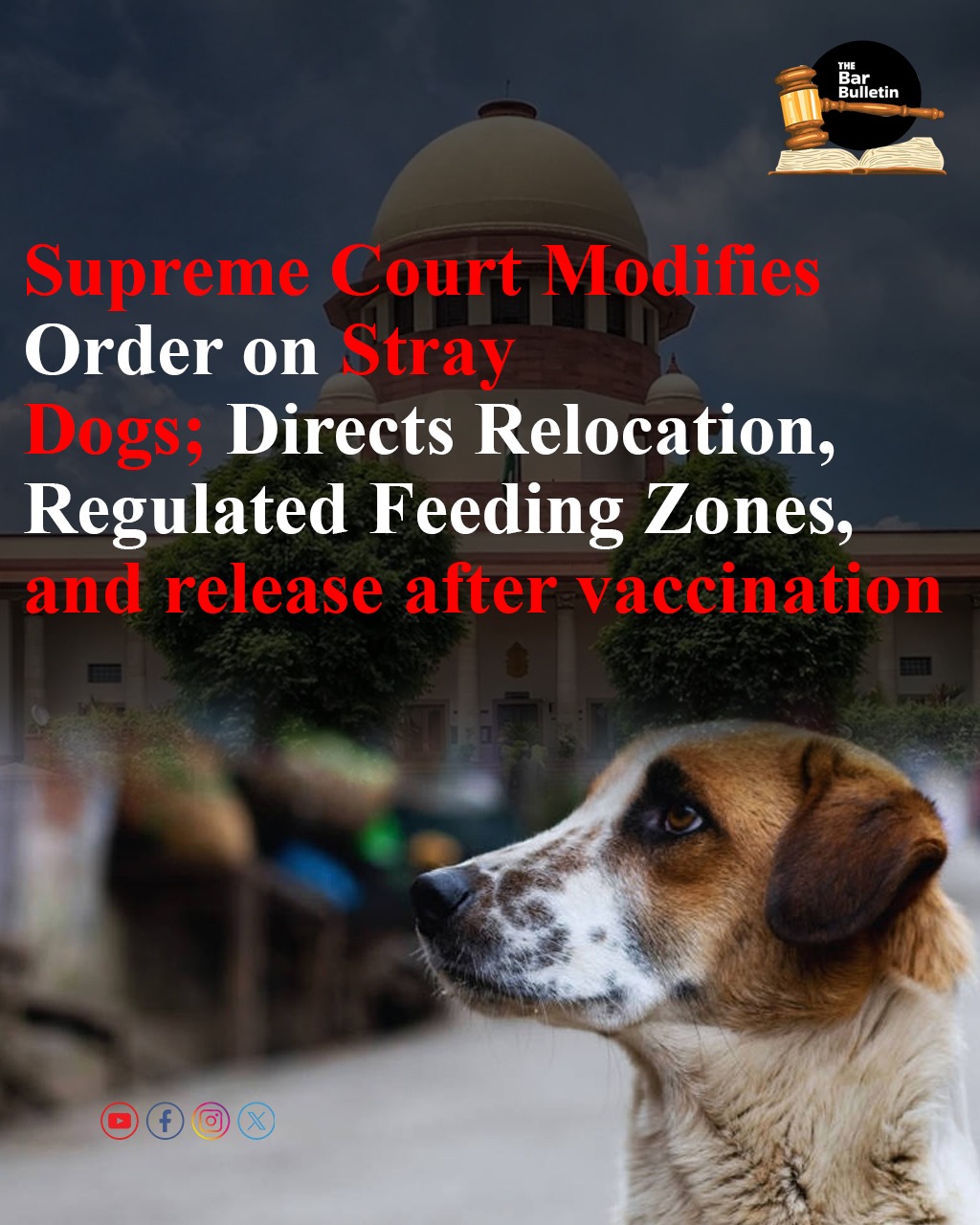On 28 July 2025, the Supreme Court took suo moto cognizance of a news report highlighting serious safety concerns stemming from the stray dog menace in Delhi, particularly tragic attacks on children by rabid dogs.
The Court issued orders in August 2025 mandating the round-up, sterilization, immunization, and confinement of stray dogs. In response, various animal welfare organizations and individuals challenged these directions as being impracticable, given the current state of infrastructure, and incompatible with the statutory Animal Birth Control (ABC) Rules, 2023.
The Court convened a new three-judge bench comprising Justice Vikram Nath, Justice Sandeep Mehta, and Justice N.V. Anjaria to reconsider the directions and address stakeholder concerns regarding their feasibility, legal conformity, and humane treatment of stray animals.
The Bench, vide their order dated 22 August 2025, modified and clarified the earlier mandatory directions issued on 11 August, 2025, concerning the management of stray dogs in Delhi and NCR. The Court struck a careful balance between public safety and animal welfare. The matter’s ambit was expanded to cover all States and Union Territories.
Key Directions Passed in the Order Dated August 22, 2025:
1. Continuation of Picking and Rounding-Up: Authorities must continue efforts to round-up stray dogs from across Delhi, NCR (Ghaziabad, NOIDA, Faridabad, Gurugram), including outskirts, and relocate them to designated shelters/pounds without delay.
2. Simultaneous Creation of Infrastructure: Authorities must continue to create and maintain sufficient shelters/pounds to accommodate the captured dogs.
3. Modification Regarding Release: The Court relaxed its earlier absolute ban on releasing sterilized and vaccinated dogs back to the streets. The recent order directs that treated stray dogs must be released back to the area from which they were captured, pursuant to ABC Rules, 2023.
Exception: Dogs confirmed or suspected to be rabid or displaying aggressive behavior must not be released back and should be detained separately in suitable facilities.
4. Implementation of Sterilization Protocol: All captured stray dogs must be sterilized, dewormed, and immunized effectively. Municipalities must allocate adequate personnel and veterinarians to address these needs regularly.
5. Feeding Regulation: Authorities must establish dedicated, controlled feeding zones in all municipal wards based on stray dog population density. Feeding of dogs in streets or public places outside these zones is strictly prohibited and subject to punitive action.
6. Public Reporting and Helpline: Municipalities must create dedicated helpline numbers for citizens to report violations such as illegal feeding or obstruction of control measures. Prompt action must be taken against reported offenders.
7. Non-Obstruction: The Court reiterated that any obstruction in implementing these orders will constitute contempt and attract severe penalties, emphasizing full cooperation from the public and NGOs.
8. Participation Conditions for Petitioners: All individual and NGO petitioners were directed to deposit a security amount (Rs. 25,000 for individuals and Rs. 2,00,000 for NGOs) within 7 days to continue as parties. These funds will be utilised towards stray dog welfare infrastructure.
9. Dog Adoption: Citizens may apply to municipal bodies for formally adopting tagged stray dogs removed from streets, assuming responsibility for their care and ensuring they do not return.
10. Status Reports and Compliance: Every authority must file affidavits reporting current capacity for shelter infrastructure, including dog pounds, qualified veterinarians, trained staff, transport facilities, and ongoing compliance with ABC rules.
The directions were extended nationally, and authorities in all States and Union Territories were impleaded via Animal Husbandry and Local Body Secretaries. High Courts across the country handling similar matters were directed to transfer those cases to the Supreme Court for consolidated adjudication.
The Court scheduled the matter for listing after eight weeks to review compliance reports and give further directions as necessary.



